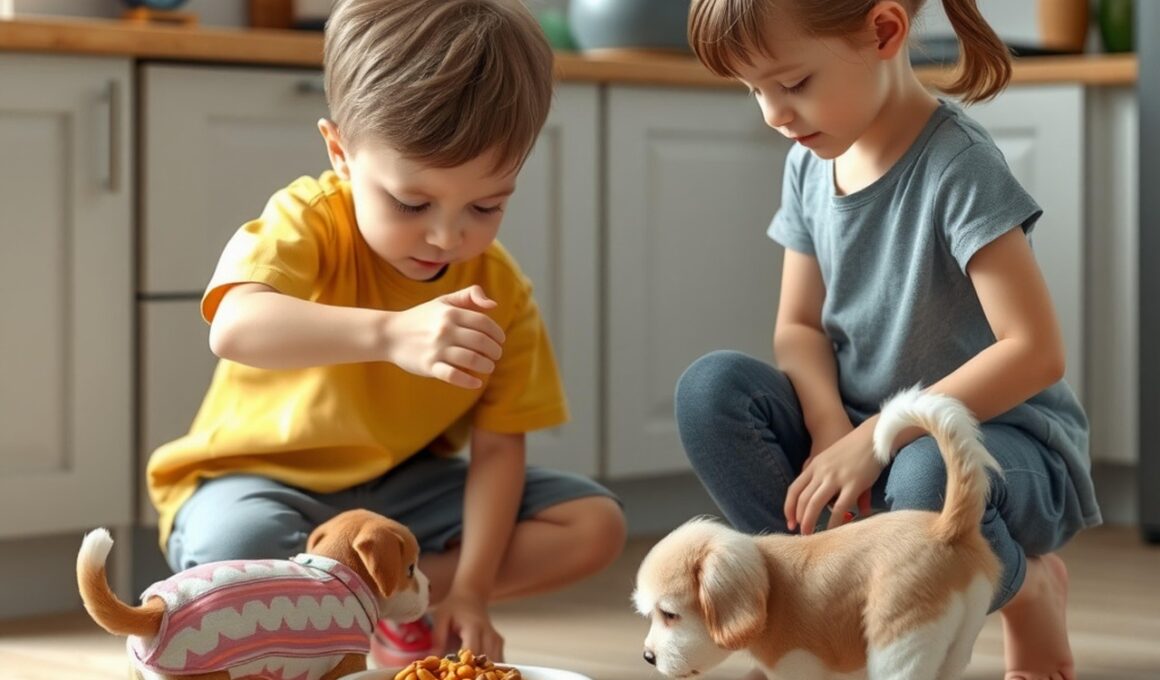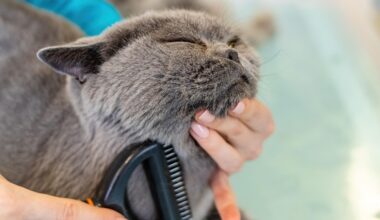Creating a Loving Environment for Your Puppy
A loving environment is crucial for the development of your puppy. Puppies thrive when they feel safe and secure within their home. To create such an environment, ensure that your living space is suitable for dogs. A cozy bed in a quiet area allows them to rest well. Furthermore, puppy-proofing your home is essential to keep them safe from hazards. This process includes removing dangerous items, securing toxic substances, and setting up barriers. It’s also beneficial to allocate a specific area for your puppy’s needs, which encompasses food, water, and toys. A designated potty area will help establish a routine for your puppy. Having a consistent schedule for feeding and potty breaks fosters a sense of stability. Engaging your puppy in interactive playtime is key to building a bond of love and trust. Consider using toys that stimulate their minds and encourage bonding moments. But don’t forget that regular socialization with other dogs and people will greatly enhance their emotional well-being as they grow and learn. These elements combine to ensure that your puppy’s adjustment to their new home is as smooth as possible.
Socialization plays a pivotal role in developing a balanced and well-adjusted puppy. Engaging your puppy with different people, dogs, and environments helps reduce anxiety and fear in unknown situations. Start socializing your puppy early, ideally between three to twelve weeks, as this is a critical window for learning. Introduce your puppy to various sights, sounds, and smells to familiarize them with the world. Visit local parks or dog-friendly cafes to expose them to larger crowds and activities. Always supervise these interactions to ensure they remain positive and stress-free. Additionally, puppy training classes can provide a great opportunity for socialization, offering controlled settings where your puppy can meet others. They also learn good behavior and commands through structured lessons. Positive reinforcement techniques greatly enhance learning and strengthen your bond with your puppy. Always reward good behavior with praise or treats to encourage more of the same. Remember to be patient; every puppy learns at a different pace. Regularly practicing these skills ensures that your puppy grows into a confident adult dog, prepared for the challenges of everyday life. Enjoy the journey of training and socializing your lovable companion!
The Importance of Playtime
Playtime is an essential aspect of bonding and nurturing your puppy. Engaging in daily interactive play helps strengthen the emotional connection between you and your furry friend. During play, dogs release energy, which is crucial for their mental health. Providing various toys enhances this experience, catering to different preferences and play styles. Rotate toys to keep your puppy interested and stimulated, preventing boredom. Fetch, tug-of-war, and puzzle toys are excellent for encouraging physical and mental activity. You can participate in structured games, which also aid in teaching commands and improving obedience. Supervised play sessions with other puppies enhance social skills and foster friendships, helping them become well-adjusted adults. During play, remember to focus on your puppy’s safety; supervise closely to prevent injuries. It’s important to learn when to rest, as puppies can become easily overexcited. Regular play will keep them physically fit and contribute to a happy temperament. Understanding your puppy’s individual energy levels will help determine the right duration and intensity of play. Building this routine ensures that your puppy’s needs are met, contributing to a healthier and happier life.
Establishing routines is fundamental to providing comfort and predictability for your puppy. Puppies thrive on consistency, which helps them feel secure in their environment. A daily schedule for feeding, bathroom breaks, and playtime promotes good habits and reduces anxiety. Start by determining appropriate meal times, aiming for three meals a day for young puppies. Always take them outside after meals to establish a potty routine. Consistent potty breaks help your puppy learn boundaries and reduce accidents indoors. In addition to the basic care routines, it’s vital to incorporate regular training sessions. Short, engaging training sessions using positive reinforcement can establish good behaviors early on. Aim for 5-10 minutes of training a few times a day. Incorporate commands like sit, stay, and come to create a well-behaved companion. This routine helps to develop their communication skills and fortifies your bond. Over time, you will notice that your puppy begins to understand what to expect each day. Enjoying this bonding time will create lasting memories and nurture the special relationship between you and your puppy.
Nutrition for Your Puppy
Proper nutrition is essential for your puppy’s growth and well-being. Feeding them a high-quality, balanced diet will ensure they receive the nutrients essential for developing strong muscles and bones. Start by selecting a puppy food specifically formulated to meet their needs. Tracking your puppy’s weight and adjusting food portions accordingly will also promote healthy growth. Puppies require several meals a day, typically three to four, to keep up with their energy levels. Always consult your veterinarian for advice on feeding schedules and nutritional guidelines specific to your puppy’s breed and age. Fresh water should always be available to keep your puppy hydrated and aid in digestion. Avoid giving table scraps, as human food may not be suitable for their digestive system. Additionally, be cautious of treats; ensure they are made for dogs and are given in moderation. Regular feeding fosters a sense of routine, enhancing their emotional stability. Remember to monitor any changes in appetite or health, which can indicate underlying issues. With patience and care in their nutrition, you will help them grow into a strong and healthy dog.
Introducing a safe and supportive environment can significantly influence your puppy’s behavior. Creating designated puppy spaces is important for safety and comfort. Use gates to restrict access to certain areas of your home, preventing accidents or unwanted chewing. Introduce a variety of toys to the designated areas, enhancing their environment. Evaluate the materials of the toys; ensure they are non-toxic and safe for your puppy. Fleecy toys tend to provide comfort, while durable toys can withstand heavy chewing. Establishing designated rest areas, equipped with beds or blankets, will make your puppy feel secure throughout the day. Always direct your puppy to these spaces when they need a break. Teaching your puppy basic commands like “leave it” or “drop it” can reinforce boundaries, reducing destructive behaviors. Scheduling quiet times during the day allows them to recharge. A stimulating yet safe environment will foster their confidence as they grow. Additionally, being present and responsive will strengthen your bond. Regularly assessing their environment is key to identifying potential hazards as your puppy grows and becomes more exploratory.
Providing Love and Affection
Love and affection are essential components of responsible puppy care. Show your puppy that they are valued through regular affection and attention. Physical touch, such as petting and cuddling, increases your puppy’s sense of security and happiness. Bonding occurs during these affectionate moments, leading to a trusting and loving relationship. Pay attention to their body language, as understanding their signals fosters better communication. Incorporating praise during positive behaviors will encourage them to repeat those actions. Verbal affirmations and gentle touches serve as effective reinforcement. Training should also include fun activities mingled with affection, creating a positive atmosphere for learning. You might notice your puppy’s response to affection will help them develop a confident temperament. Emphasizing non-verbal communication, like maintaining eye contact or relaxed body posture, contributes significantly to your bond. Additionally, setting aside quality time for one-on-one interactions will enhance your connection further. A loving atmosphere nurtures a delightful relationship that fosters lifelong companionship. Embrace this special journey and cherish the comforting, unconditional love dogs provide.
Creating a loving environment for your puppy is a rewarding journey. The efforts you invest will shape their personality and well-being. Establishing a nurturing home filled with interaction, care, and affection lays the foundation for their future. Frequent play and socialization will expand their experiences while providing essential training opportunities. Feeding a balanced diet and ensuring a safe environment will contribute significantly to a thriving puppy. Establishing routines and encouraging positive behaviors helps in building trust and reducing stress. Monitoring their growth and needs will pave the way for better health management. Understanding the importance of love and companionship highlights the bond you are creating. These relationships are built on mutual respect and affection, which last a lifetime. Remember to cherish every moment spent along the way, filled with joy, learning, and laughter. The love you show to your puppy is a reflection of the commitment you make to their happiness. Together, you’ll navigate the challenges and successes of canine companionship, creating memories that last forever. Embrace this adventure and make the most of every moment with your puppy.


